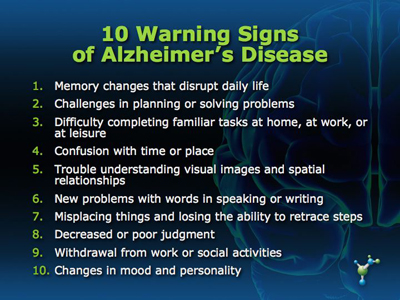|
November is National Alzheimer's Disease Awareness Month
by Monique Johnson, MD
National Alzheimer's Disease Awareness Month is a national health observance promoted by the Alzheimer’s Association,(1,2) the nation’s leading voluntary health organization in Alzheimer’s disease (AD) care, support, and research.(3) The Alzheimer’s Association believes that staggering statistics make it important for all Americans to be informed about key aspects of this neurodegenerative illness.
Key Statistics(4)
- As many as 5.3 million people in the United States are living with Alzheimer’s.
- Every 70 seconds, someone develops Alzheimer’s.
- Alzheimer's is the seventh-leading cause of death.
- Alzheimer's and dementia triple healthcare costs for Americans age 65 and older.
During November, consider doing the following to increase your AD knowledge:
- Note warning signs for dementia in family members and loved ones.
If you are unsure about what to look for, access a new education campaign that the Alzheimer’s Association released this year called “Know the 10 Signs: Early Detection Matters”.(5)

- Learn what is meant by the term “mild cognitive impairment” (MCI).
MCI describes a condition of subtle cognitive decline in which symptoms are generally detectable on tests and may be noticed by other people, but are not of a severity that impairs participation in activities of daily living (ADLs). It is because there is no impairment in ADLs, that the patient does not meet criteria for a diagnosis of dementia. While MCI is associated with increased risk of developing dementia, not all patients will.(6)
- Learn from the stories of real patients and their caregivers.
More than half of Americans know someone with the condition. That means that most of us can easily spend some time getting to know about the daily challenges of living with the disease. The realities of living with his disease has also been captured in an HBO documentary called The Alzheimer’s Project, produced in cooperation with the Alzheimer’s Association, the NIH National Institute on Aging, and other partners. This Emmy award-winning multi-part series reveals both the effects on patients and the momentum that scientific research is gaining discovering ways to treat and possibly prevent the disease.(7)
Do you have feedback for the author? Click here to send us an email.
Download printable version here.
References
- U.S. Department of Health and Human Services. National Health Information Center. 2009 National Health Observances. http://www.healthfinder.gov/nho/default.aspx. Accessed October 18, 2009.
- Alzheimer’s Association. Upcoming Events. http://www.alz.org/news_and_events_upcoming_events.asp. Accessed October 22, 2009.
- Alzheimer’s Association. About Us. http://www.alz.org/about_us_about_us_.asp. Accessed October 22, 2009.
- Alzheimer’s Association. 2009 Alzheimer’s Disease Facts and Figures. Alzheimer's Dement 2009;5:234-270.
- Alzheimer’s Association. Know the 10 signs. http://www.alz.org/alzheimers_disease_know_the_10_signs.asp. Accessed October 22, 2009.
- Petersen RC. Practice parameter: Early detection of dementia: Mild cognitive impairment (an evidence-based review): Report of the Quality Standards Subcommittee of the American Academy of Neurology. Neurology 2001;56:1133-1142.
- HBO. The Alzheimer’s Project. http://www.hbo.com/alzheimers/about-the-project.html. Accessed September 30, 2009.
|
|